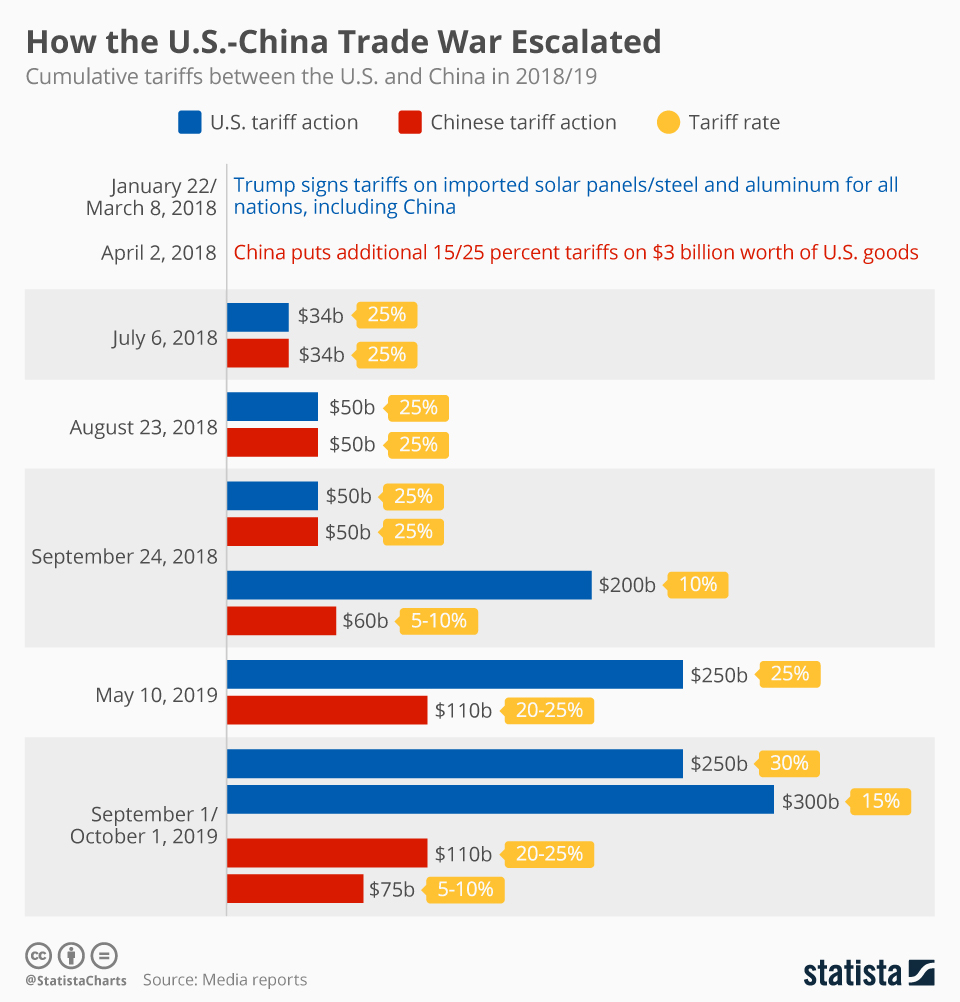
The relationship between the U.S. and China is on the verge of a breakdown. The global superpowers are battling each other on a range of geopolitical and macroeconomic issues – including trade, security, investment, Hong Kong, and the origins of the Covid-19 pandemic.
The risks of such a situation are evident. At worst, they could lead to a full-fledged military conflict. Even if Washington and Beijing manage to avoid a war, their 40-year long commercial relationship based on the idea of globalization could collapse.
The U.S.-China Trade War
The problem lies in the absence of mutual benefits. Former U.S. President Bill Clinton in 2000 prompted Congress to approve a so-called U.S.-China trade agreement, believing it would prosper Washington’s economic interests.
However, Mr. Clinton’s administration later accused the Chinese of failing to comply with global trade rules. For instance, Beijing gave limited access to its markets to the U.S. but became the biggest exporter of Chinese goods to the country. Meanwhile, Washington also accused the Chinese government of breaching copyrights and patent laws.
Years later, the current U.S. president, Donald Trump, reraised the issue, advocating tariffs to reduce the U.S. trade deficit and promote regional manufacturing.

Under his tenure, the U.S. imposed four rounds of tariffs worth $550 billion on Chinese imports. The most recent taxation targeted electronics, meat, musical instruments made in China.
Meanwhile, Beijing responded with more than $185 billion worth of tariffs on U.S. goods.
Phase One Deal
On January 14, 2020, the U.S. and China signed a so-called “Phase One deal” at the White House.
The agreement witnessed Washington reducing duties from 15 to 7.5 percent on $120 billion worth of Chinese goods. Meanwhile, Beijing agreed to buy additional U.S. goods and services, costing about $200 billion until the end of 2022.
Covid-19 Pandemic
The trade deal hit a rough patch when a virus originated from a meat market in China’s Wuhan turned into a global pandemic.
Trump accused his counterpart, the Chinese premier Xi Jinping, of blanketing the Covid-19 outbreak from the rest of the world. The virus to this date has infected 2.21 million Americans and has killed more than 119,000.
The noise was not merely political. In retrospect, the Covid-19 outbreak forced governments to announce extended lockdowns to contain the spread. That led to big economies, including the U.S., China, the U.K, Germany, Japan, India, entering recession.
The Chinese energy use collapsed during the first quarter of 2020 as a result of the lockdown rules, which led to a significant economic collapse. As a result, Beijing imported almost nothing in January, February, but a mere $320 million worth of U.S. goods in March.
ForeignPolicy.com called the phase one deal, “dead.”
On the other hand, Trump and other western economies have joined hands in mousetrapping China for an investigation into the origins of the Covid-19 pandemic. Beijing has pushed back to global pressure.
Bitcoin against Trade War
Over the years, people have speculated about the role of Bitcoin during a macroeconomic and geopolitical crisis. It is because the cryptocurrency exhibits the economic properties of Gold.
The rising trade war between the U.S. and China serves as an ideal hotbed for breeding the next generation of Bitcoin investors.
The first notable thing to mention is the impact of the souring relationship between the two superpowers on financial gateways. For instance, China’s forced imposition of national security law in Hong Kong led top U.S. officials to threaten economic sanctions.
The impact grows louder on the financial sector that risks suffering extreme losses atop the bulldozing effect of the Covid-19 pandemic on the economy.

China’s export-driven share has dipped from 36 percent of GDP to 20 percent. Those looking to set up their base outside the mainland may need credible tools to move their capital abroad even as existing financial routes decay. It may lead them to the safety of cryptocurrencies like Bitcoin.
Meanwhile, high barriers owing to trade war, coupled with aggressive quantitative easing practiced by the People’s Bank of China, would leave yuan in a weaker zone. In 2019, the central bank forcibly moved the currency lower to trade below $7 per yuan. Such devaluations could also allow investors to hedge their capital into Bitcoin.

Billionaire hedge fund tycoon Paul Tudor Jones made this argument in his investment letter in May 2020, stating that he would hold Bitcoin because it reminds him of Gold from the 1970s. The yellow metal acted as a safe-haven during the financial crisis.
Finally, as worries over Covid-19 move businesses online, coupled with fiat devaluation owing to the massive money printing by central banks, people should start opting for solutions that fall outside the purview of both Chinese and U.S. government. The analogy may help Bitcoin becoming a de facto global currency.
The post Analysis: How Bitcoin Would Fare against a More Brutal US-China Trade War appeared first on CoinStats Blog.
from CoinStats Blog https://blog.coinstats.app/analysis-how-bitcoin-would-fare-against-a-more-brutal-us-china-trade-war/?utm_source=rss&utm_medium=rss&utm_campaign=analysis-how-bitcoin-would-fare-against-a-more-brutal-us-china-trade-war
No comments:
Post a Comment